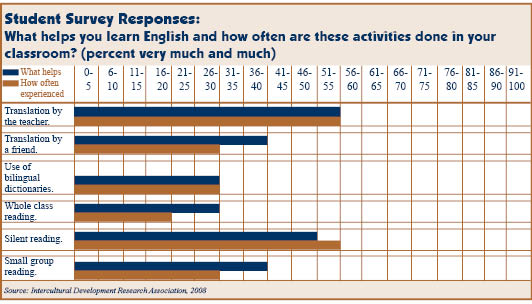• by Josie Danini Cortez, M.A. • IDRA Newsletter • November – December 2008 • 

Last year, the National Economic and Social Rights Initiative published Deprived of Dignity, Degrading Treatment and Abusive Discipline in New York City and Los Angeles Public Schools (Sullivan, 2007). NESRI cites the Convention on the Rights of the Child, “The most widely ratified human rights treaty in the world requires schools to provide an environment where children feel safe, supported and are able to learn regardless of race, class, age, language or other factors” (2007). The authors go on to cite Article 29 of the Convention, “Education of the child shall be directed to the development of the child’s personality, talents and mental and physical abilities to their fullest potential [and] the development of respect for human rights and fundamental freedoms.”
Since its inception, the Intercultural Development Research Association has taken a stand for children, giving voice when others would not. For more than 35 years, the organization has dedicated itself to ensuring that all children have an equitable and excellent education, especially those who often are disenfranchised. We have worked with countless teachers, administrators, families, communities and policymakers to make sure schools are places where “children feel safe, supported and are able to learn regardless of race, class, age, language or other factors.”
IDRA’s work is based on a fundamental premise, “All children are valuable; none is expendable.” When schools begin with the premise that all children are valuable, then students are precious assets, families are meaningful partners and teachers and administrators are fully engaged in making sure all students develop to their fullest potential. And students have a voice that is listened to by the adults who teach them and who make decisions that affect their lives.
IDRA amplifies student voices so they resonate clearly with those entrusted with their future. Thirty-five years ago, Dr. José Angel Cárdenas, IDRA founder and director emeritus, listened to children who were being denied their fundamental right to an excellent education because of where they lived, and what they said became IDRA. Twenty-five years ago, we listened to students who had left high school before graduating, and what they told us in IDRA’s Dallas Dropout Study became IDRA’s Coca-Cola Valued Youth Program – a program that has made an extraordinary difference in the lives of more than 25,000 students in the United States, Puerto Rico, the United Kingdom and Brazil by keeping 98 percent of them in school.
When students are asked what they think, they are being taught that they are active and meaningful participants in their education and that what they have to say matters. This is especially important for students who rarely have a chance to speak or who are usually heard through a filter imposed by some adults – a filter that says they are “at risk” or are “troublemakers.” When these students are asked to voice their concerns, their issues, their solutions, and adults respond with respect, dignity and action, students learn to speak up. Here are a few examples of IDRA eliciting student voices and how their opinions and insights make a difference.
Student Voice for Program Accountability
Coca-Cola Valued Youth Program tutors tell us through monthly journal entries, pre- and post-tests and case study interviews whether or not the program is having its proven transformational impact.
“This past month, the best thing about tutoring was that I helped my tutees a lot with their reading so they can read better and be somebody in this life so they can like school better and not drop out like some other kids in Texas that have dropped out. I will never drop out because I like school just like my tutees.”
“The best thing about tutoring was when my tutees told me I was the best tutor in the world… Doesn’t that make you feel better if you are having a bad day? To me, tutoring is the best thing that has happened to me in a long time.”
Student Voice: Speaking Truth to Power
Student voice became a critical part of IDRA’s Brown and Mendez Blueprint Dialogues for Action as students were asked how the promise of Brown vs. Board of Education and Mendez vs. Westminster has yet to be fulfilled in their schools. During the dialogue event in Albuquerque, IDRA worked with local students from Albuquerque public high schools to learn about the landmark cases and, with the help of Critical Exposure, photographically capture their school realities, in the context of Brown and Mendez.
Students then formally presented their photographs and perspectives to the dialogue participants who were charged with developing the community blueprints for change. The students’ images reveal both progress made in the 50 years since the Brown decision and the need for continuing efforts to ensure that all students have access to a high quality education. The images and stories set the context and tone for what remains to be done and the call to action that faces the Albuquerque community.


Student Voice to Inform Instructional Practice
As we work with schools, we bring this amplification of student voice and perspective to the foreground with surveys and interviews, we help teachers elicit student perspective and then use that information to inform and strengthen instructional practice. We help teachers engage students in their classrooms as active contributors and, in doing so, teachers often learn as much as their students do.
One recent example involved more than 100 high school English language learner students surveyed by IDRA for their perspectives on what needed improvement in their school’s quality teaching and programmatic and instructional practices. Students were asked, “What helps you learn to read and write in English?” Their responses proved invaluable to teachers as they compared what English language learner students said worked best for them and what teachers were actually doing in the classroom. See box below for a sample of their insights.
As teachers, school administrators and staff listen to students differently, they begin to see them differently, and the result is a school that respects and honors the inherent dignity of everyone who passes through its front door, giving students safe passage to their future.
We see this transformation time and again. It speaks volumes about valuing young people, listening to them and remembering the power of student voice.
“One voice can change a room, and if a voice can change a room, it can change a city. And if it can change a city, it can change a state. And if it can change a state, it can change a nation. And if it can change a nation, it can change the world.” (Barack Obama, Nov. 3, 2008 speech, Manassas, Virginia.)


Resources
Sullivan, E. Deprived of Dignity, Degrading Treatment and Abusive Discipline in New York City and Los Angeles Public Schools (New York, N.Y.: National Economic and Social Rights Initiative, 2007).
Josie Danini Cortez, M.A., is an IDRA senior education associate. Comments and questions may be directed to her via e-mail at feedback@idra.org.
[©2008, IDRA. This article originally appeared in the November – December 2008 IDRA Newsletter by the Intercultural Development Research Association. Permission to reproduce this article is granted provided the article is reprinted in its entirety and proper credit is given to IDRA and the author.]


